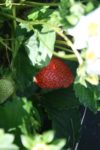The educational materials listed on this page are about Composting.
Many farms, especially organic farms, utilize compost for fertility, but what exactly is composting? Compost soil is made up of green waste (e.g. grass clippings) and brown waste (e.g. dried leaves) that provide nitrogen and carbon, respectively. With the right ratio of each, microbes in the compost begin to break down the material, turning it into organic matter. Composting methods depend on what type of farming is being done and at what scale. Other forms of composting include vermicomposting, or worm composting, which uses red worm composting to produce compost. Specialty crop farmers can make mushroom compost from the waste of mushrooms, and livestock farmers often compost manure over time. Compost making requires time, careful maintenance and the correct ratio of input materials. Key practices include nutrient cycling, nutrient management, organic fertilizers, composting, compost extracts, earthworms, organic matter, soil quality/health, soil stabilization.
Building Soils for Better Crops will help you understand soil structure, soil fertility and overall soil management, including composting to increase organic matter. Diversifying Cropping Systems can be useful in identifying practices that enhance diversity on farms, such as manure management for livestock operations. The Small Ruminant Toolbox guides producers who are managing small livestock enterprises and managing composted manure in cropping systems.
Showing 1-1 of 1 results

Evaluating Nutrient, Soil Health, and Economic Benefits of Compost Additions to Summer Cover Crops for Strawberries in North Carolina
Over the past 8 years, a team of multidisciplinary faculty and students at NC State University have conducted various field-based studies at the Center for Environmental Farming Systems (CEFS) and on-farm research examining the impact of summer cover crops, compost additions and applications of beneficial arbuscular mycorrhizal fungi and vermicompost on soil health, nutrient availability, and yields in conventional and organic strawberry production systems.